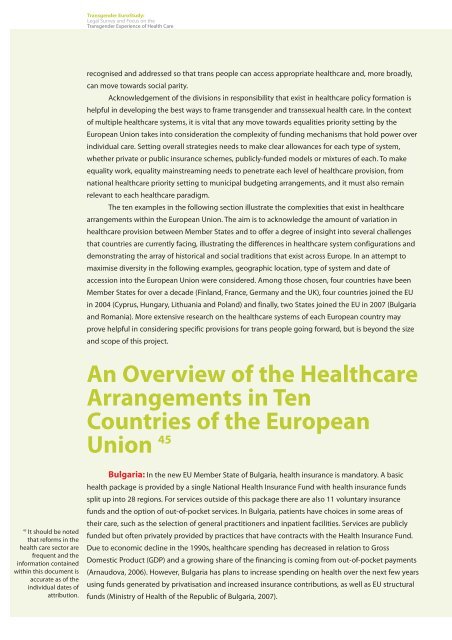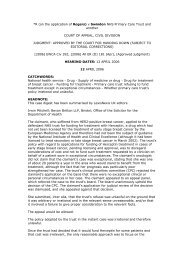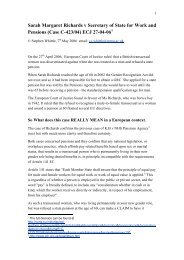Transgender EuroStudy â Legal Survey and Focus ... - ILGA Europe
Transgender EuroStudy â Legal Survey and Focus ... - ILGA Europe
Transgender EuroStudy â Legal Survey and Focus ... - ILGA Europe
Create successful ePaper yourself
Turn your PDF publications into a flip-book with our unique Google optimized e-Paper software.
<strong>Transgender</strong> <strong>EuroStudy</strong>:<br />
<strong>Legal</strong> <strong>Survey</strong> <strong>and</strong> <strong>Focus</strong> on the<br />
<strong>Transgender</strong> Experience of Health Care<br />
recognised <strong>and</strong> addressed so that trans people can access appropriate healthcare <strong>and</strong>, more broadly,<br />
can move towards social parity.<br />
Acknowledgement of the divisions in responsibility that exist in healthcare policy formation is<br />
helpful in developing the best ways to frame transgender <strong>and</strong> transsexual health care. In the context<br />
of multiple healthcare systems, it is vital that any move towards equalities priority setting by the<br />
<strong>Europe</strong>an Union takes into consideration the complexity of funding mechanisms that hold power over<br />
individual care. Setting overall strategies needs to make clear allowances for each type of system,<br />
whether private or public insurance schemes, publicly-funded models or mixtures of each. To make<br />
equality work, equality mainstreaming needs to penetrate each level of healthcare provision, from<br />
national healthcare priority setting to municipal budgeting arrangements, <strong>and</strong> it must also remain<br />
relevant to each healthcare paradigm.<br />
The ten examples in the following section illustrate the complexities that exist in healthcare<br />
arrangements within the <strong>Europe</strong>an Union. The aim is to acknowledge the amount of variation in<br />
healthcare provision between Member States <strong>and</strong> to offer a degree of insight into several challenges<br />
that countries are currently facing, illustrating the differences in healthcare system configurations <strong>and</strong><br />
demonstrating the array of historical <strong>and</strong> social traditions that exist across <strong>Europe</strong>. In an attempt to<br />
maximise diversity in the following examples, geographic location, type of system <strong>and</strong> date of<br />
accession into the <strong>Europe</strong>an Union were considered. Among those chosen, four countries have been<br />
Member States for over a decade (Finl<strong>and</strong>, France, Germany <strong>and</strong> the UK), four countries joined the EU<br />
in 2004 (Cyprus, Hungary, Lithuania <strong>and</strong> Pol<strong>and</strong>) <strong>and</strong> finally, two States joined the EU in 2007 (Bulgaria<br />
<strong>and</strong> Romania). More extensive research on the healthcare systems of each <strong>Europe</strong>an country may<br />
prove helpful in considering specific provisions for trans people going forward, but is beyond the size<br />
<strong>and</strong> scope of this project.<br />
An Overview of the Healthcare<br />
Arrangements in Ten<br />
Countries of the <strong>Europe</strong>an<br />
Union 45<br />
45<br />
It should be noted<br />
that reforms in the<br />
health care sector are<br />
frequent <strong>and</strong> the<br />
information contained<br />
within this document is<br />
accurate as of the<br />
individual dates of<br />
attribution.<br />
Bulgaria: In the new EU Member State of Bulgaria, health insurance is m<strong>and</strong>atory. A basic<br />
health package is provided by a single National Health Insurance Fund with health insurance funds<br />
split up into 28 regions. For services outside of this package there are also 11 voluntary insurance<br />
funds <strong>and</strong> the option of out-of-pocket services. In Bulgaria, patients have choices in some areas of<br />
their care, such as the selection of general practitioners <strong>and</strong> inpatient facilities. Services are publicly<br />
funded but often privately provided by practices that have contracts with the Health Insurance Fund.<br />
Due to economic decline in the 1990s, healthcare spending has decreased in relation to Gross<br />
Domestic Product (GDP) <strong>and</strong> a growing share of the financing is coming from out-of-pocket payments<br />
(Arnaudova, 2006). However, Bulgaria has plans to increase spending on health over the next few years<br />
using funds generated by privatisation <strong>and</strong> increased insurance contributions, as well as EU structural<br />
funds (Ministry of Health of the Republic of Bulgaria, 2007).








